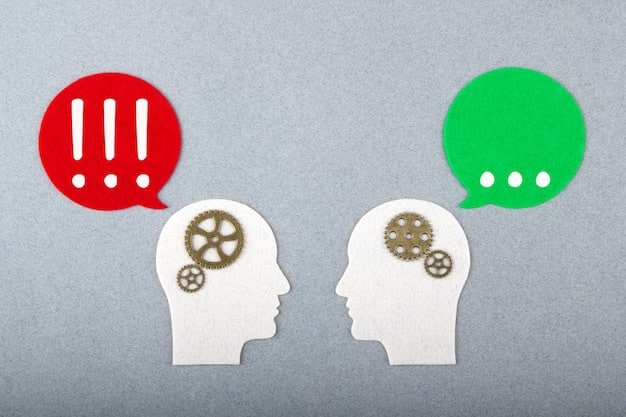Relationship Red Flags: 7 Warning Signs in 2025

Relationship red flags in 2025 include communication issues, controlling behavior, lack of trust, disrespect, unresolved conflict, emotional unavailability, and inconsistent effort; these signs indicate underlying problems that may lead to unhealthy relationship dynamics and potential long-term issues.
Navigating relationships can be complex, and identifying potential issues early is crucial for long-term happiness. Understanding relationship red flags: 7 warning signs to watch out for in 2025 can empower you to make informed decisions and cultivate healthier connections.
Identifying Communication Issues as a Red Flag
Communication is the cornerstone of any successful relationship. When issues arise in this area, it’s important to recognize them as potential warning signs. Open, honest, and respectful dialogue paves the way for understanding and growth.
Lack of Open Dialogue
One of the primary communication red flags is a lack of open dialogue. It becomes challenging to resolve conflicts or foster intimacy. Communication breakdown can lead to misunderstandings and emotional distance.
Constant Interruptions and Talking Over
Frequent interruptions or the act of talking over each other can signal disrespect and a power imbalance. Healthy communication involves active listening and valuing each other’s perspectives.
- Avoid defensiveness in conversations.
- Practice active listening by summarizing and reflecting.
- Create a safe space for honest sharing.
Addressing communication red flags early can prevent further damage and promote a healthy dynamic. Building strong communication skills will strengthen the foundation of your relationship.

Why Controlling Behavior Is a Significant Red Flag
Controlling behavior in a relationship is a significant red flag because it undermines trust, autonomy, and equality. Recognizing such behavior is crucial for protecting your well-being and safety.
Signs of Control and Manipulation
Signs of controlling behavior can include isolating you from friends and family, monitoring your activities, or demanding constant updates on your whereabouts. These actions aim to maintain power and dominance within the relationship.
Impact on Self-Esteem and Independence
Controlling behavior erodes self-esteem and independence, making it difficult for individuals to assert their needs and boundaries. It often leads to emotional and psychological distress.
- Recognize controlling patterns and their impact.
- Set clear boundaries and assert your independence.
- Seek support from friends, family, or a therapist.
Addressing controlling behavior requires awareness, setting firm boundaries, and seeking support. Prioritizing your safety and well-being is essential when faced with this red flag.
Lack of Trust: A Critical Relationship Red Flag
Trust is the foundation upon which healthy relationships are built. A lack of trust can manifest in multiple forms and can severely damage the connection between partners.
Inconsistencies and Deception
Inconsistencies in stories or behaviors are major indicators of deception, and can erode the sense of reliability and security. Over time, this can lead to a deep-seated lack of trust.
Jealousy and Suspicion
Excessive jealousy and unwarranted suspicion are destructive forces in a relationship. These feelings often stem from insecurity and can lead to controlling behaviors.
Rebuilding trust is a long-term process that requires honesty, consistency, and a willingness to address past issues. Without trust, a relationship is unlikely to thrive, making it a critical red flag to watch for.
Why Disrespect in a Relationship Is Intolerable
Disrespect in a relationship can manifest in different forms. Recognizing and addressing these behaviors is crucial for maintaining a healthy partnership.
Verbal Abuse and Belittling
Verbal abuse, including name-calling, insults, and belittling remarks, is a clear sign of disrespect. Such behavior erodes self-worth and creates a toxic environment.
Ignoring Boundaries and Needs
When partners consistently ignore each other’s boundaries and needs, it signals a lack of regard for their well-being and autonomy. Mutual respect requires recognizing and honoring each other’s limits.

- Identify specific instances of disrespect.
- Communicate the impact of these behaviors.
- Establish clear boundaries and expectations.
Addressing disrespect is vital for fostering safety and respect within the relationship. Engaging in open communication and seeking professional help can guide partners toward healthier interactions.
Unresolved Conflict as a Relationship Red Flag
Relationships inevitably involve conflicts, but consistently leaving these issues unresolved can create long-term problems. Efficient conflict resolution is key to a healthy relationship.
Avoiding Difficult Conversations
Avoiding difficult conversations can lead to pent-up emotions and resentment. This avoidance prevents the necessary dialogue to understand and address underlying issues.
Repeating Arguments
When the same arguments resurface repeatedly without resolution, it suggests a lack of progress in understanding each other’s perspectives. Repeating arguments indicate deeper, unaddressed problems.
Effective conflict resolution involves open communication, empathy, and a willingness to compromise. By learning to address conflicts constructively, partners can strengthen their relationship and build resilience.
Emotional Unavailability: A Core Relationship Red Flag
Emotional unavailability in a relationship involves a partner who is unwilling or unable to share feelings, provide support, or connect on a deeper level. This can create a significant emotional gap between partners.
Difficulty Expressing Emotions
One of the primary indicators of emotional unavailability is difficulty expressing emotions. This can manifest as detachment, aloofness, or an inability to engage in vulnerable conversations.
Avoiding Intimacy and Vulnerability
Emotionally unavailable partners often avoid intimacy and vulnerability, keeping the relationship superficial. These behaviors often stem from fear of rejection or past emotional wounds.
- Explore the reasons behind emotional unavailability.
- Communicate your needs for emotional connection.
- Seek therapy to address underlying emotional issues.
Addressing emotional unavailability requires patience, understanding, and a willingness to work on emotional awareness. Encouraging partners to explore their feelings can lead to more fulfilling relationship dynamics.
Inconsistent Effort as a Red Flag
Inconsistent effort in a relationship is a notable red flag that signifies a lack of investment and commitment. Both partners need to consistently contribute to the well-being of the relationship.
Unpredictable Attention and Affection
Inconsistent attention and affection can make a partner feel insecure and undervalued. Predictable effort fosters stability. This inconsistency can lead to anxiety and uncertainty within the relationship.
Unmet Promises And Neglected Responsibilities
Failing to fulfill promises and neglecting responsibilities demonstrates a lack of consideration for the other person’s needs. Consistency in actions builds trust and reliability.
Addressing inconsistent effort involves open communication about expectations, values, and relationship goals. Addressing inconsistency with honest communication can revitalize and strengthen the bond between partners.
| Key Aspect | Brief Description |
|---|---|
| 🚩 Communication Issues | Lack of open dialogue or constant interruptions signals problems. |
| 🛑 Controlling Behavior | Controlling actions undermine autonomy and equality in the relationship. |
| 💔 Lack of Trust | Inconsistencies and jealousy erode the foundation of a healthy relationship. |
FAQ
▼
Early signs include isolating you from friends and family, excessively checking on your whereabouts, and making decisions for you without your input. These subtle actions escalate over time.
▼
Practice active listening, schedule regular check-ins, and be honest about your feelings without blaming. Consider couples therapy to learn effective communication techniques and build stronger ties.
▼
Initiate open, gentle conversations about your needs for emotional support and try to understand the reasons behind their emotional unavailability. Professional therapy can significantly help too.
▼
Rebuilding trust requires consistent honesty, transparency, and accountability. Take responsibility for past actions, demonstrate commitment to change, and allow time for healing, which may need help through a therapist.
▼
Inconsistent effort means that their level of engagement and commitment fluctuates unpredictably, leading to feelings of uncertainty and devaluation. It indicates a potential imbalance in the relationship’s dynamics.
Conclusion
Identifying and addressing relationship red flags is crucial for maintaining healthy, fulfilling partnerships in 2025. Being aware of these warning signs allows individuals to take proactive steps to improve communication, build trust, and establish clear boundaries, leading to stronger, more resilient relationships based on mutual respect and consistent effort.





